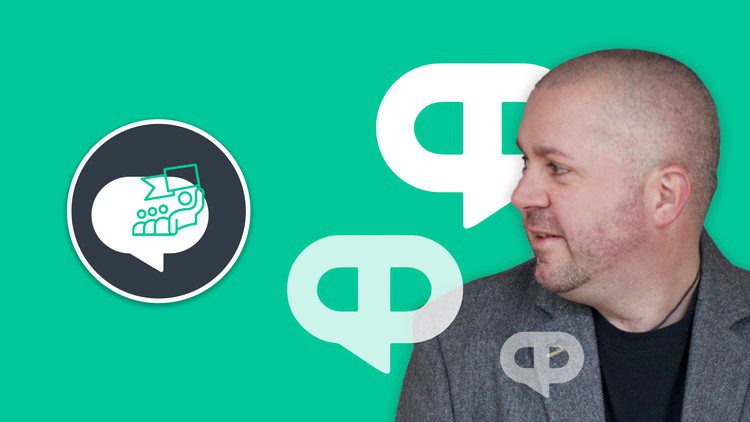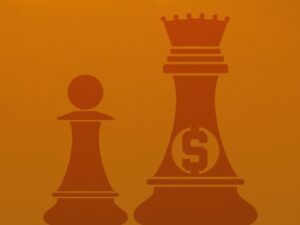La pleine conscience pour un management et un leadership hautement efficaces
- Description
- Curriculum
- FAQ
- Reviews
Leaders are defined by their ability to help others succeed. At this time in history, wisdom, compassion, and selflessness are required for successful leadership as much as ever, but the relentless drive for growth and performance makes this a very tough proposition for so many leaders. This training course presents a powerful and practical path for leadership development in the 21st century.
Leading others is about bridging the gap between the people they work with and the goals of the organization they are part of. To be effective, leaders must cultivate mental resilience, emotional maturity, and interpersonal awareness. Leadership is about commitment to excellence and making a difference. In today's world, leaders must be strong, reflective, humble, wise, and sincere. Mindfulness training lays a foundation for these qualities.
Being mindful will help you become more resilient and more able to balance work and life outside of work. This means being able to reflect objectively and maintain a strategic overview, while also improving your ability to listen and communicate. Mindfulness provides practical tools for self-awareness, mental health, stress control, and more. Practiced within a leadership framework, it becomes much more than a typical leadership training.
Leadership that inspires people to become confident in themselves is exceptional. By combining mindfulness principles with world-class leadership theory, Mindfulness for Highly Effective Management and Leadership is an essential tool for self-aware managers and leaders. The course simplifies mindfulness concepts and provides a pragmatic framework for leaders to cultivate profound levels of self-awareness, wellbeing, and effectiveness.
Voici quelques-uns des sujets que vous apprendrez au cours de cette formation :
-
The connection between mindfulness and influential leadership.
-
The neuro-plasticity and neuro-flexibility of the human mind.
-
Principles pertaining to continuing professional development.
-
An Integrated Framework for Strategic and Rational Thinking.
-
How to lead more effectively in the face of everyday challenges.
-
Leadership's responsibility to lead people to their best selves.
-
Being focused, initiative-driven and empathic when leading others.
-
Practicing presence, non-judgement, and creative problem-solving.
-
Leading with gentle guidance, and not heavy-handed controlling.
-
Et bien d'autres choses encore.
Those who are currently in or aspiring to leadership positions will find Mindfulness for Highly Effective Management and Leadership an invaluable resource. As a result, you will develop skills and behaviors that are applicable both to your personal and professional lives. Integrating these practices enhances professional relationships and workplace environments, adding significant positive impact beyond your own learning.
Practicing mindfulness leads to increased self-awareness, better mental health, stress reduction, and more. When viewed from the standpoint of a leader, it becomes more than just another leadership tool. The course is both a mindfulness and a leadership training, revealing points of overlap and illustrating the natural parallels. By taking this course, you will learn mindfulness from the perspective of real-life skills and applications.
Many people never experience the connected relationships, rewarding careers, and fulfilling lifestyles enjoyed by those who dedicate their lives to learning mindfulness and improving themselves. Personal growth remains a mystery to many leaders. Therefore, if you take only one thing from this training, let it be that the only thing standing in the void between where you are and being a significantly more influential leader, is yourself.
There is currently a leadership crisis in the world, despite the fact that over $46 billion is spent annually on leadership development. Throughout this training, you will learn how mindful and self-aware leadership turns conventional leadership thinking upside down. This course redefines what it means to be an effective leader, and provides a practical, hard-hitting solution to any organization's engagement and execution challenges.
“The course is relevant and useful to all, not just for those in leadership positions. It is a fascinating learning experience that addresses critical aspects of how the mind works, awareness, and focus. This was my first Achology training, and certainly won't be my last.” – Pradeep Kamal Singh
This thought-provoking training course is part of a larger curriculum of self-improvement and professional development training courses, designed by Kain Ramsay Ltd, and hosted within the Achology community peer-learning environment. The training course is accompanied by a 30-day money back guarantee, so if you're not satisfied with the format, you can get your money back – no questions asked.
-
1Welcome to Mindfulness for Highly Effective Management and LeadershipVideo lesson
Greetings and welcome to the Achology Mindfulness for Highly Effective Management and Leadership online course. You will hear from Kain Ramsay, your instructor, who introduces the format of this online course and how you can expect to benefit from this online learning experience.
-
2Soutien aux cours et questions fréquemment posées (FAQ)Text lesson
Comme vous vous êtes inscrit à cette formation sur Udemy, voici un lien pratique vers la base de données des questions les plus fréquemment posées sur Udemy afin que vous puissiez tirer le meilleur parti de cette formation en ligne le plus rapidement possible. Vous y trouverez des réponses à toutes les questions les plus fréquemment posées concernant les cours sur Udemy.
-
3Rejoignez le groupe de discussion GRATUIT d'Achologie "Les principes dans la pratique".Text lesson
Souhaitez-vous discuter des leçons que vous apprenez dans ce cours ?
Si c'est le cas, vous pouvez demander à rejoindre le groupe de discussion "Les principes dans la pratique".
Le groupe Facebook Principles into Practice a été fondé en 2016 dans le but de réunir des personnes du monde entier qui étudient ou ont étudié les cours de formation à la demande de Kain Ramsay ou d'Achology.
-
4Three Categories of Human ObservationVideo lesson
When we become fascinated by life, we see it in different ways. Observation skills refer to the ability to use all five of your senses to comprehend, analyze, and recall your surroundings. The practice is often associated with mindfulness because it encourages you to be aware of the details in your everyday life. Kain discusses three ways to view, so that you may benefit most from this course.
-
5Learning How to Listen MindfullyVideo lesson
The goal of mindful listening is to listen without judgment, criticism or interruption, while being aware of internal thoughts and reactions that may get in the way of people being able to communicate effectively with you. Mindfulness is not about clearing our minds of all thoughts, but rather about being aware of the thoughts you are thinking. The theme of this teaching is learning how to listen mindfully.
-
6The Five Degrees of Self-ReflectingVideo lesson
In self-reflective behavior, we use our mind to think before we speak; to contemplate before we judge or evaluate. There is an important gap between stimulus and response, and within this gap is our capacity to make decisions about what we will say or do next. Here, Kain discusses the five degrees of self-reflection, which is the process that we all have the opportunity to engage in during this 'gap'.
-
7The Basics of Mindfulness: What is It?Video lesson
We have all had moments of being physically present in a room while a conversation is taking place and yet mentally being elsewhere. Likewise, most of us have had the experience of reading a page in a book before realizing we could not recall what we’d just read. In this video, Kain discusses the basics of Mindfulness, how it works, and why it’s essential for effective leadership or management.
-
8The Three Dimensions of MindfulnessVideo lesson
The basic theory of mindfulness is simple. The human mind does many things outside of awareness. While there are several ways to practice Mindfulness, you should first understand its three basic components. By understanding how our internal dimension impacts various aspects of our lives, we can make better and more informed decisions. The video teaches the 3 dimensions of mindfulness.
-
9The Three Personal Culture ZonesVideo lesson
Your personal culture is the combination of the cultures that you belong to at any given time, and you identify with those cultures. In this video, Kain discusses the three personal culture zones; a teaching that gives you a framework for understanding your own growth process and offers insight into how to become the kind of leader that other people will find naturally appealing to follow.
-
10Conscious Awareness Versus AutopilotVideo lesson
Wise, intentional leadership is needed now more than ever. With our world becoming increasingly complex and challenging, we need to think carefully about how we lead, plan, and organize ourselves. Leading mindfully is one way to achieve this, but what is a mindful leader and how do we become one? As part of this video, Kain contrasts conscious awareness with mindlessness (autopilot).
-
11Exercise: The Art of Becoming Disciplined in MindfulnessVideo lesson
Discipline contributes to the stability and structure of a person's life. Individuals who are disciplined are capable of handling stress and taking responsibility for their actions. The key is not to lose our ground, even when working with high-passion individuals or stressful situations. Kain outlines questions we can ask ourselves to remain level-headed when faced with uncertainty or challenge.
-
12A Guide to Overcoming DistractionVideo lesson
Recognizing the problems that distraction creates is half the battle. As for the other half, it involves developing strategies to overcome it and identifying ways to improve focus. In order to overcome distractions, it is first necessary to identify them. As Kain discusses in this video, self-awareness is essential to developing the kind of self-discipline needed to remain centered and focused.
-
13The Mindfulness 'Full-Cycle' ModelVideo lesson
We are often told to be ourselves, but this can be challenging if we don't know who we are. As is explained in this video, the full-cycle Model of mindfulness consists of three parts. Mindfully aware doesn't mean you're at peace with everyone; it means you're aware of your biases. Kain asks questions in each factor of the model that help us understand ourselves and our lives better.
-
14Mindfulness and Positive Leadership IntentVideo lesson
By becoming more mindful, we are more likely to become aware of the intentions underlying our words, actions, and behaviors. People tend to believe that just having goals is enough to achieve them. The idea is untrue. In order to achieve our leadership goals and objectives, we must prioritize positively framed goals over negatively framed ones. Kain explains throughout this video.
-
15Factors That Undermine Mindful AwarenessVideo lesson
If we are primarily concerned with what is happening inside of our heads, we are not able to spend the necessary time being mindfully aware of someone else. Kain explains the factors contributing to the breakdown of mindful awareness, providing an additional base for ongoing self-reflection.
-
16Fundamental Attitudes of MindfulnessVideo lesson
Being mindful means being aware of one's self. Being mindful is neither mystical nor religious. You will learn the fundamental characteristics of mindfulness as being non-judgment, patience, beginner's mind, trust, non-entitlement, non-striving, self-acceptance, accepting things and accepting others, and learning how to let things be as they are.
-
17A Contemplation of the MindVideo lesson
In order to live mindfully and maturely, individuals must be able to discern between the brain and the mind. The mind is the set of faculties responsible for mental phenomena. Often the term is also identified with the phenomena themselves. These faculties include thought, imagination, memory, will and sensation. In this video, we make a thorough evaluation of the human mind.
-
18The Four States of ConsciousnessVideo lesson
People tend to take four main attitudes toward living their lives. As a term, consciousness refers to your awareness of your physical and mental experiences. Self-awareness does not look the same for everyone. Human consciousness comprises several states and a variety of factors can impact these states. i.e. A person's readiness to grow, develop, and mature.
-
19Consciousness: The Road to Waking UpVideo lesson
In many cases, people lead an unconscious existence. In order to live a progressive life, it is imperative we wake up. Consciousness is not a biological process that occurs in the mind, but is rather a form of behavior that is controlled by the mind, just as all other forms of human behavior are. In this video, Kain elaborates on the experience of waking up and becoming fully conscious in life.
-
20Fin de l'évaluation de la première sectionVideo lesson
This section of the Mindfulness for Management and Leadership course presents self-reflection questions designed to help you reflect upon the central ideas and concepts you have learned so far.
-
21Don't look up or down; look within!Video lesson
The majority of us are taught self-discipline is a necessary skill that will lead us to success in the future. It is common for people to look to the wisdom of their parents, society, and the world for guidance concerning the truths of life, but the truth is that we possess all the answers we require within ourselves. In this video, Kain presents an analogy to unpack this concept further.
-
22The Dimensions of Human ExperientialismVideo lesson
Humans are both brilliant and flawed, sensitive and savage, exquisitely caring yet painfully indifferent, remarkably creative yet highly destructive. Some aspects of our human experience are undeniable by all. It is common for some to use the term "mind" while others may use "brain". We can benefit from creating a vocabulary to describe our human experiences. Let's explore what it means to be human.
-
23The Five Stages of Spiritual GrowthVideo lesson
Growing spiritually is about connecting with your inner self, becoming more mindful of life around you and developing inner strength, character, resilience, integrity and congruence. In this video, Kain discusses the stages of growth we go through as human beings. The degree to which we will influence other people will be to the degree to which we have been influenced.
-
24The Five Stages of Self-AwarenessVideo lesson
Self-awareness is how an individual consciously knows and understands their own character, feelings, motives, and desires. In this video, Kain discusses the five different stages of self-awareness.
-
25Seven Roadblocks to Personal GrowthVideo lesson
Many of us are capable of much more than we accomplish, and often do not live up to our potential. By learning how to identify roadblocks to personal growth, we are able to avoid self-defeating behaviors. In this video, Kain identifies seven roadblocks to personal growth: learned helplessness, unidentified opportunity, undeveloped vocabulary, a state of comparison, and a destiny attitude.
-
26Self-Reflection Exercise: QuestionsVideo lesson
In this video, Kain introduces a self-reflection exercise to help you develop a comprehensive understanding of yourself by considering in detail each of the roadblocks to personal growth.
-
27The Mindful 'Wise' Mind ModelVideo lesson
This video explores Kain's view of mind as part of the Wise Mind Model's broader concept, which has been approved by the American Psychological Association. There are three different parts of our minds (the rational, emotional, and the wise). This fascinating model explores what occurs in each.
-
28A Guide to Accurate Self-IdentificationVideo lesson
En s'identifiant à ce que l'on fait, notre identité dépend de nos performances. Il existe de nombreuses façons de se définir qui limitent le potentiel de croissance et d'expansion, ce qui affecte négativement l'estime de soi et la confiance en soi. Dans cette vidéo, Kain propose un cadre pour une auto-identification appropriée, positive et non restrictive.
-
29The Actual Self (Now) Vs. The Ideal Self (Future)Video lesson
Le moi réel fait référence à la façon dont les individus se perçoivent de manière réaliste, tandis que le moi idéal fait référence à la façon dont les gens aimeraient se voir ou à la façon dont ils aimeraient apparaître. Cette vidéo traite d'un enseignement dans lequel Kain établit une distinction entre notre moi réel (qui nous sommes actuellement) et notre moi idéal (la personne que nous espérons devenir dans le futur).
-
30Self-Identification and Lack of Intentional DefinitionVideo lesson
Identifying ourselves by what we do makes our identity dependent on our performance. There are many ways in which people define themselves that limit their potential for growth and expansion, which negatively affects their self-esteem and self-confidence. The point of this video is to offer a framework for identifying with one's special characteristics in a positive, unrestrictive, and helpful way.
-
31Self: The Road to Insight & Understanding (Part 1)Video lesson
Humans have a tendency to fear the unknown. More than ever before, we are creatures of comfort and luxury. Leaving our comfort zone to explore, experiment, and experience requires a lot of effort. When we examine the meaning we have placed on our life events, we gain insight and understanding into who we are. Past experiences can have a strong hold on people. With this video, Kain shares his timeline and explains how valuable and clarifying it can be to ‘piece together’ our life experiences.
-
32Self: The Road to Insight & Understanding (Part 2)Video lesson
It's human to fear the unknown. We all are creatures of comforts and luxuries, more today than ever. The idea of leaving our comfort zone to explore, experiment and experience requires an enormous effort. When we take time to understand the meaning we've placed on our life events, we gain insight and understanding into who we are. People often become bound to their past experiences. In this video, Kain shares his timeline and illustrates how profound this exercise can be.
-
33The Life Transition Curve (Based on Kubler Ross)Video lesson
Change curves are derived from the work of Kubler-Ross and describe the emotional journey people experience when dealing with change or transition. People go through several stages during this process, including shock, denial, anger, bargaining, depression, and acceptance. Kain uses Kubler-Ross' Model Life Transition Curve to describe the ongoing process of transition in life.
-
34Time, Space and the Stress PrincipleVideo lesson
Stress is an emotional or physical tension. Feelings of frustration, anger, and nervousness can be triggered by any event or thought. Stress is a physical reaction to a challenge or a demand. Stress is not a conclusion in itself - it comes from somewhere. Kain discusses the stress theory in this video, unpacking where stress comes from and how we can most effectively reduce stress in our lives.
-
35Homework: Self-Reflection ChallengeVideo lesson
The act of journaling is an excellent method of reflecting on our learning. You are the sum of all the experiences you have had leading up to this point in your life. The story of your life is perhaps one of the most valuable assets that you possess. In this video, Kain introduces a homework exercise to help you examine your own story: your past, present, and future.
-
36Defining Your Unique Reference PointVideo lesson
As the name implies, a reference point is something used to make comparisons or to evaluate another object. Setting a unique reference point for our future gives us something to aim for and helps us to move forward. In the following video, Kain outlines the most useful method for identifying and how this will serve as a positive reference point for your ongoing leadership or management.
-
37Resource: Growing in Self-AwarenessVideo lesson
Many people live their lives as if they were human doings rather than human beings. Under the 'human doings' category we are those who define themselves according to what they do. In this video, Kain introduces his self-awareness workbook to assist you in further developing your self-awareness.
-
38Understanding Flexibility in PersonalityVideo lesson
Par ignorance, certaines personnes se définissent par des traits de personnalité interchangeables. C'est l'un des moyens les plus faciles de saper l'estime de soi et la confiance en soi. Hans J. Eysenck, psychologue comportemental d'origine allemande, a développé un modèle de flexibilité de la personnalité. Kain décompose le modèle d'Eysenck et affirme que la manière dont nous nous identifions influence notre volonté de changer et d'évoluer.

Commencer
Académie

Les cookies sont de petits fichiers de données qu'un site Web envoie subrepticement à votre ordinateur, souvent sous la forme de fichiers texte ou de fichiers image. Les cookies nous permettent de stocker ou de récupérer des informations sur votre navigateur, qui pourraient être utilisées pour identifier qui vous êtes. Ces données sont généralement utilisées pour faire fonctionner le site comme vous l'attendez. Vous avez la possibilité de désactiver certains cookies car nous respectons votre vie privée. Pour en savoir plus et modifier vos paramètres, cliquez sur l'un des titres de catégorie ci-dessous. Le blocage de certains types de cookies, en revanche, peut sérieusement nuire à votre expérience sur le site et à l'accès aux services.
Ces cookies permettent au site Web de fournir des fonctionnalités et une personnalisation améliorées. Ils peuvent être définis par nous ou par des fournisseurs tiers dont nous avons ajouté les services à nos pages. Si vous n'autorisez pas ces cookies, certains ou tous ces services peuvent ne pas fonctionner correctement.
Les cookies que nous avons mis en place sur ce site pour vous permettre de partager notre contenu avec vos amis et vos réseaux sont à l'origine de l'existence de ces cookies. Ils peuvent suivre votre navigateur sur différents sites et créer un profil de vos intérêts. Cela peut influencer le matériel et les messages que vous voyez sur d'autres sites Web. Vous ne pourrez peut-être pas utiliser ou voir ces outils de partage si vous n'acceptez pas ces cookies.
Les cookies de partenaires publicitaires peuvent être utilisés sur notre site Web pour créer un profil de vos intérêts et afficher des publicités pertinentes sur d'autres sites Web. Ils ne collectent pas d'informations personnellement identifiables, bien qu'ils soient construits sur l'identification unique de votre navigateur et de votre appareil Internet. Vous recevrez des publicités moins ciblées si vous refusez ces cookies.
Ces cookies sont essentiels au fonctionnement du site Web et ne peuvent pas être désactivés dans nos systèmes. Ils ne sont généralement définis qu'en réponse à des actions que vous effectuez, ce qui équivaut à une demande de services, comme la définition de vos préférences de confidentialité, la connexion ou le remplissage de formulaires. Vous pouvez modifier les paramètres de votre navigateur pour bloquer ou vous alerter de ces cookies, mais certaines parties du site ne fonctionneront pas correctement si vous le faites. Ces cookies ne stockent aucune information permettant d'identifier personnellement quelqu'un.
Compter les visites et mesurer l'activité est essentiel pour maintenir un site Web performant. Ces cookies nous permettent de faire exactement cela en fournissant des informations sur les pages les plus/moins populaires, la façon dont les utilisateurs se déplacent sur le site, etc. Sans ces cookies, nous ne serions pas en mesure d'améliorer les performances de notre site.

Rejoignez notre cercle restreint et ne manquez jamais un battement
De nouveaux cours, de nouvelles informations et de nouvelles compétences ont le potentiel d'améliorer considérablement votre vie. Assurez-vous de ne rien manquer et informez-vous automatiquement.
* Nous détestons les spams et vous promettons de ne rien envoyer que vous ne vouliez pas. En vous inscrivant, vous acceptez nos politique de confidentialité.










